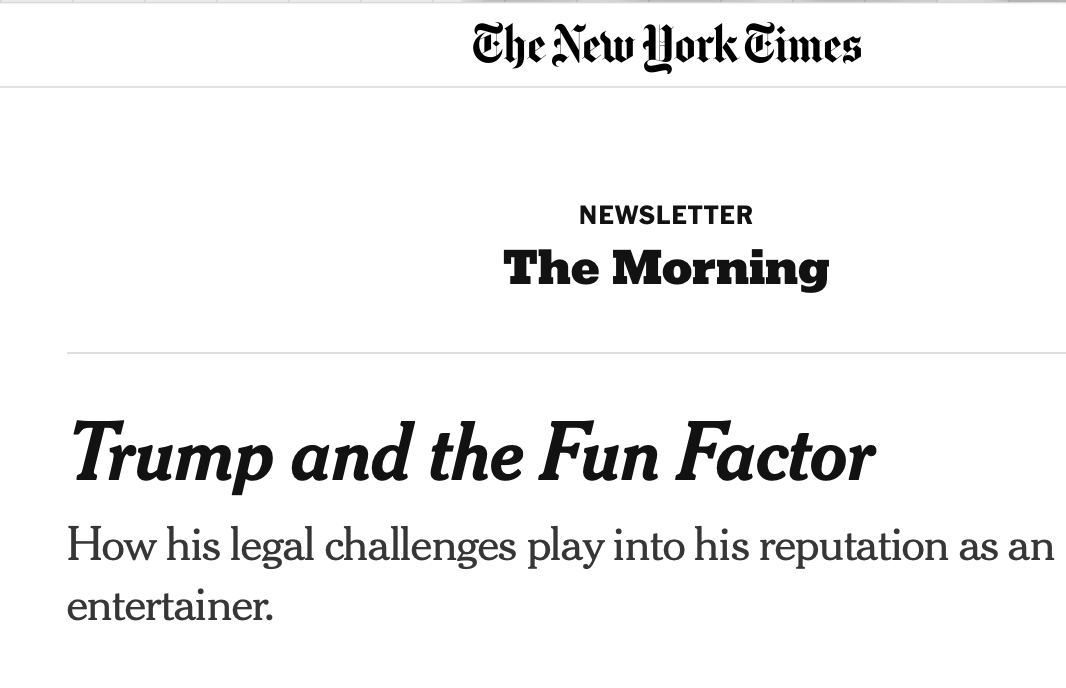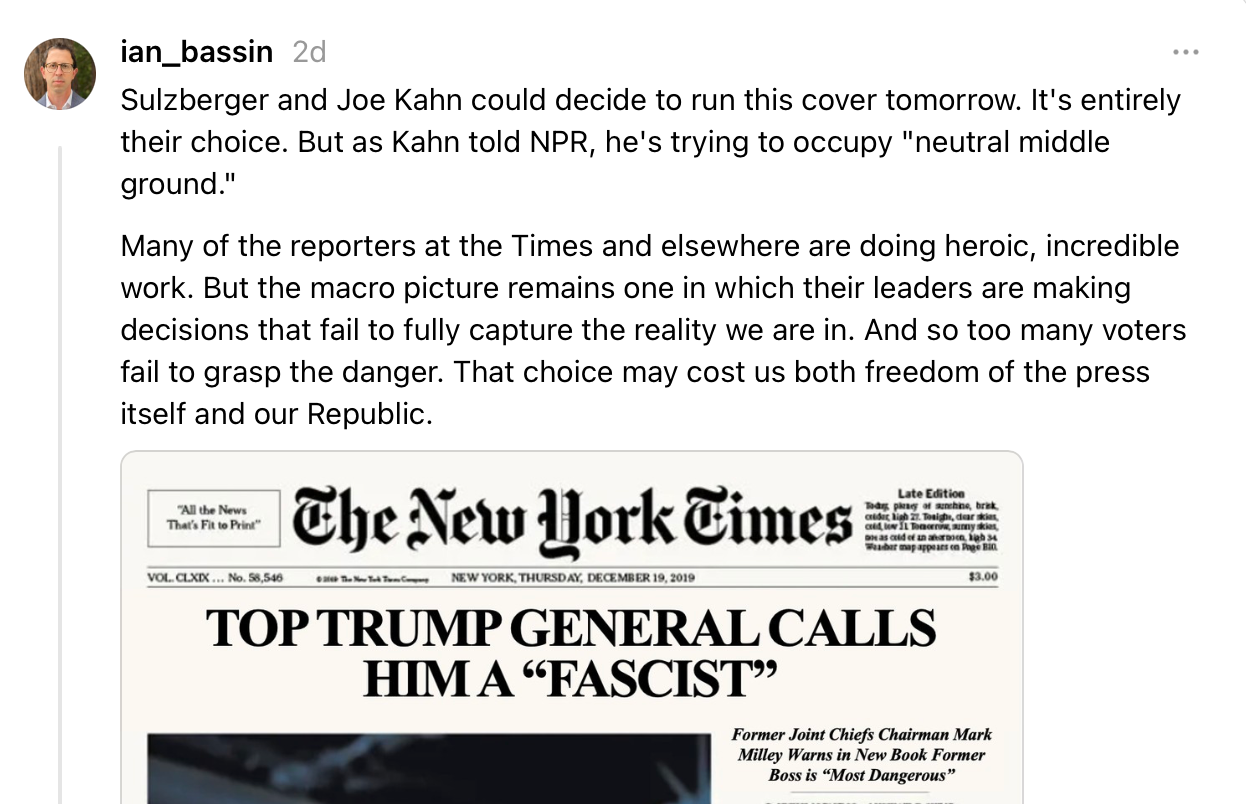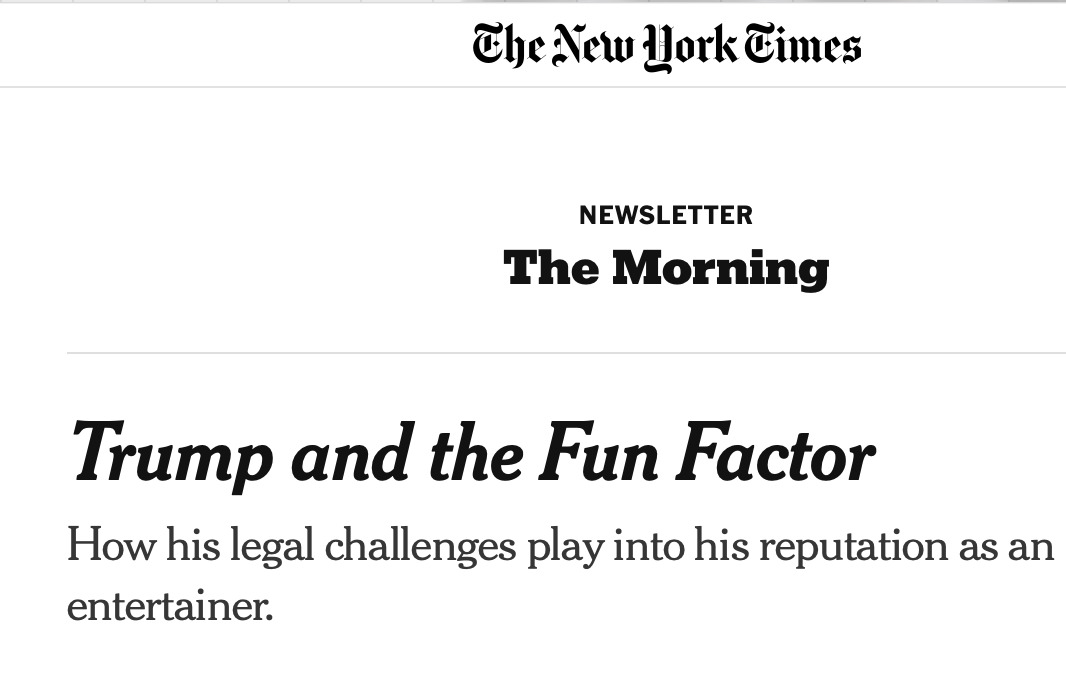A New York Times reporter tells on his own newspaper

New York Times reporter Jonathan Weisman recently lashed out on Threads at the suggestion that the Times should prominently cover statements by Donald Trump’s former Chairman of the Joint Chiefs of Staff that Trump is a “fascist”:

“It’s silly to criticize us because we have no effect on anything whatsoever” is an extremely common response journalists offer to their critics — it’s the second such comment I saw from a prominent journalist today alone. It’s incredibly dumb and I don’t think anyone actually believes it — the New York Times is the world’s most influential news company; that’s why people like Jonathan Weisman want to work there.1
But I’ve explained why it’s dumb and wrong and disingenuous often enough and I don’t feel like doing that today. Instead, let’s pretend Weisman is sincere and see where that leads us.
First, here’s the comment to which Weisman was responding:

That’s pretty tame stuff, really. It praises the New York Times for doing “heroic, incredible work” and merely suggests that in order to “fully capture the reality we are in” the paper should devote prominent coverage to things like the revelation in a new Bob Woodward book that Donald Trump’s former top military adviser says Trump is “fascist to the core.” (As it turns out, the Times devoted just two sentences to the Milley comments, in the 25th paragraph of an article about Trump supporters not believing bad things about Trump.)
Weisman doesn’t contest the argument that the Times “fails to fully capture the reality we are in” — that its choices of what stories to emphasize downplay the threat Donald Trump poses to America. He instead simply claims it doesn’t matter.

I should note that Jonathan Weisman isn’t some junior reporter just out of college. Following stints at the Washington Post, USA Today, and Wall Street Journal, he’s been at the Times for more than a decade and was the paper’s deputy Washington editor until he was demoted for racist tweets. So he’s a pretty experienced hand around the Times’ newsroom. And according to Jonathan Weisman:
- The New York Times has influence over only its own readers, nobody else.
- New York Times readers are “almost all voting for Kamala Harris” and the paper has no influence with either Trump voters or swing voters.
- This fact justifies the New York Times downplaying revelations that make Donald Trump look bad.
The implication is striking: The New York Times2 thinks its role is to soften the resolve of people planning to vote against Donald Trump.
That’s the logical conclusion we must draw from Weisman’s post. If the New York Times thinks it can influence only people who would vote for Democrats, and thinks this should be a factor in its editorial decisions, then its editorial decisions that downplay damaging information about Republicans and hype damaging information about Democrats can only be understood as efforts to reduce support for Democrats.
Once we realize that, so much of the Times’ behavior makes sense.
Why did the New York Times treat Joe Biden’s age as a national emergency while giving comparitively little attention to Donald Trump’s age and mental capacity, which is declining rapidly from an alarmingly low starting point? Well, if the Times thinks it can influence only people who were going to vote for Joe Biden, the answer is obvious, right? The paper wanted to reduce support for Biden. Why did the Times treat Hillary Clinton’s email like the most important story in the 2016 election? Because it wanted to erode support for Clinton.
Why does the New York Times downplay (and in some cases ignore entirely) Trump’s authoritarian threats? Why is it giving scant coverage to newly-unsealed evidence relating to Donald Trump’s indictment for crimes relating to the January 6 insurrection? Why does it help Trump obscure his deep hostility to abortion rights? Because it wants potential Harris voters to be complacent about the threat Trump poses.
My own view is that the news media should not make coverage decisions by trying to game out the impact they have on the electorate. They should instead report true things in proportion to their importance. That’s their role in a democracy. Their role is not to play amateur political strategist and make coverage decisions based on how they think they can sway their audience. But if they say that’s what they’re doing, we should listen to them, and think through the implications. And the implication of a senior New York Times journalist justifying coverage that downplays Donald Trump’s fascist plans for America by saying the only people the New York Times can influence are Harris voters is that the New York Times is trying to weaken support for Harris among its readers. That it is intentionally avoiding strengthening the resolve of its readers to vote against Donald Trump.

FWIW I have never seen a journalist insist on the irrelevance of the profession while preening about the great civic importance to democracy of a Democrat giving them more interviews, or about the respect and deference they should be accorded due to the sacred role the news media plays in democracy, or while bragging about their employer’s Pulitzer nominations. At all those times, journalists are more than happy to remind us how important they are. It’s only when defending their poor work and that of their peers that they insist on their irrelevance. But please subscribe! Democracy dies in darkness! ↩
Or, at least, one of its star reporters, who used to be a deputy editor for the Times. ↩
Member discussion